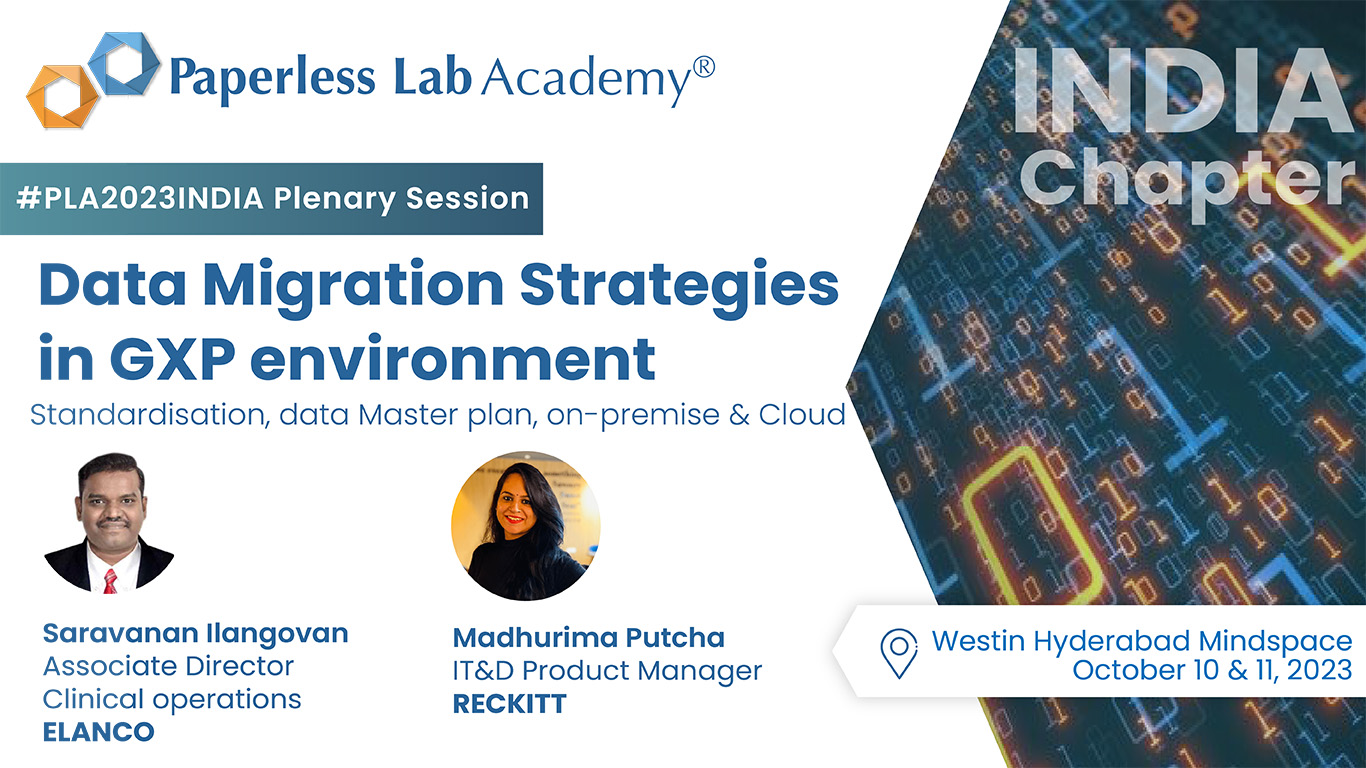Data Migration Strategies Session at the PLA2023India

At some point on the path to digital transformation, organizations undertake data migrations for a number of reasons. They might need to overhaul an entire system, upgrade databases, establish a new data warehouse, move to cloud, or merge new data from an acquisition or other source. Data migration is also necessary when deploying another system that sits alongside existing applications. While this may seem fairly straightforward on paper, in reality it requires a change (change of storage, database, or application) and requires considering several parameters before event starting and make sure that the migration is a success.
We are glad to propose a dedicated session to that important topic, our keynote speakers Ms Madhurima Putcha, IT&D Product Manager at Reckitt and Mr. Saravanan Ilangovan, Corporate Registrar at Elanco will share their experiences about their own project, two very interesting data migration projects and strategies.
In this session, data migration will be addressed from two different angles. On the one hand, a data migration project with the main goal of standardization and harmonization within an on-premises infrastructure approach, and on the other hand, a data migration project to the cloud with strong focus on GXP requirements.
Transform your R&D with Digital Innovation and Legacy Wisdom
 Presenting: Saravanan Ilangovan, Associate Director in ELANCO’s Clinical Operations.
Presenting: Saravanan Ilangovan, Associate Director in ELANCO’s Clinical Operations.
Elanco has been part of Eli Lilly’s animal health business for more than 50 years. When Elanco separated from Eli Lilly, the two companies also had to separate their businesses and data in a very short period of time. Despite these special business circumstances, Mr. Ilangovan will present a typical situation where the main goal is harmonization and standardization. This is a remarkable challenge, considering that structured and unstructured data have different formats and that legacy systems usually work in silos to begin with. Saravanan will share with us his company’s strategy to implement a “one-system” approach” while employees work without interruptions.
Path to the Cloud for GXP Systems
 Presenting: Ms Madhurima Putcha, IT&D Product Manager at Reckitt
Presenting: Ms Madhurima Putcha, IT&D Product Manager at Reckitt
With so much of cloud transformations happening everywhere, Life science industry is also taking steps towards the cloud transformations. While for technology-oriented systems have better approach towards cloud, it is always a complex path when we try to move a GXP/regulatory and highly human sensitive data into cloud. I will be talking about my experience in migrating some of LIMS and Clinical related system into IaaS and SaaS clouds and how easy or difficult it was for us to achieve this transformation without disrupting the business process.
Why a comprehensive data migration strategy prevents major issues
Whether data is migrating from inputs to a data lake, from one repository to another, from a data warehouse to a data mart, or to or via the cloud. Without a competent data migration plan, organizations may go over budget, face overwhelming data processes, or find that their data operations fall short of expectations. Less successful migrations can result in inaccurate data that contains redundancies and unknowns. This can happen even when the source data is fully usable and appropriate. In addition, problems that were already present in the source data can be amplified when transferred to a new, more complex system
The presentations will be followed by a panel discussion with the two experts, Ms. Putcha and Mr. Ilangovan, and Ms. Muñoz-Willery as moderator, in which the audience can actively participate to learn more about how to take the right steps for your project.
In preparation for this session, here some food for thoughts
Critical factors to be considered for a successful data migration
- Know your data: Before migration, source data needs to undergo a complete audit. Unexpected issues can surface if this step is ignored.
- Cleanup: Once issues are identified they need to be resolved. This may require additional software tools and third-party resources because of the scale of the work.
- Maintenance and protection: Data undergoes degradation after a period of time, making it unreliable. In order to maintain the data quality it is requires to put down some controls in place
- Governance: Tracking and reporting on data quality is important because it enables a better understanding of data integrity. The processes and tools used to produce this information should be highly usable and automate functions where possible.
In addition to a structured, step-by-step procedure, a data migration plan should include a process for bringing on the right software and tools for the project. At the Paperless Lab Academy® you should expect good overview of the industry offering by visiting the exhibition hall and attending their interactive workshop at #PLA2023India
Ms Madhurima Putcha, IT&D Product Manager at Reckitt
Ms Madhurima Putcha has 12 years of experience handling LIMS transformation programs, both on-pre migrations and cloud transformations. She got extensive experience in connected Labs specifically in QC and supply areas and recently working for R&D area as well.
Madhurima has a Masters in computer science. She is a very passionate women trying to build competent Lab and R&D tools and products for her business and always believe a product should go hand in hand with process.
Saravanan Ilangovan, Associate Director in ELANCO’s Clinical Operations.
He has 19 years of experience in pharmaceutical digitalization. He is a seasoned professional who has been at the forefront of driving digital innovation and transformation within the industry. Saravanan’s journey in pharmaceutical digitalization began with a strong foundation in technology and a deep understanding of the unique challenges and opportunities within the pharmaceutical landscape. Over the years, he has successfully led and implemented a wide range of large-scale digital initiatives across the pharmaceutical industry in India and EMEA, which includes Scientific Data Mining, Electronic Laboratory Notebook (GXP / cGMP), Compound Management, Inventory Management, Instrument Management, SDMS, and Legacy Data Migration with the adoption to latest technologies trending in the industries.
Saravanan’s expertise extends to areas such as process mining, supply chain digitalization, and regulatory compliance. He collaborated closely with cross-functional teams, stakeholders, and industry partners in planning and ensured the successful implementation of digital strategies that meet regulatory requirements and deliver tangible results.
As an industry leader in pharmaceutical digitalization, I am driven by the belief that technology can be a powerful catalyst for positive change in healthcare. I am dedicated to shaping the future of the pharmaceutical industry, creating a patient-centric ecosystem that embraces digital transformation and harnesses the full potential of technology to improve lives and make a lasting impact.
Latest Posts
Key Topics of the PLA2024India
PLA2024India, 5th edition, promises a programme full of interactions and discussions. 4 focused sessions and 2 training workshops The main theme of #P
14 May 2024
Press Release: PLA® Conferences to partner with IA-Meetings for its 5th Indian Edition.
The Paperless Lab Academy® (PLA) is a leading conference about digital transformation of laboratory and quality processes. Above all, it is about mas
08 April 2024
The #PLA2024Europe programme aimed to highlight the importance of the human factor in digital transformation with several presentations and panel disc
19 March 2024

